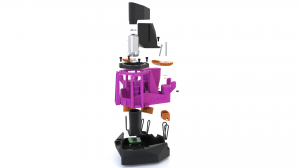University of Bath academics have designed a 3D-printed precision microscope that will enable laboratories across the world to analyse samples and detect diseases for a fraction of the cost of traditional commercial versions.
The OpenFlexure Microscope, pictured, is a fully automated, laboratory-grade instrument with motorised sample positioning and focus control – and can be built for as little as £15. A commercial microscope intended for lab use can cost tens of thousands of pounds. 
It has been designed by the Bath team to be easy to use, with its own intuitive software, and as it is highly customisable, it can be adapted for laboratory, school, and home use.
It is also unique among 3D-printed microscopes in its ability to yield high-quality images.
But the team behind it say its best facet is that it is far more affordable than a commercial microscope, both in terms of the upfront and maintenance costs
The £15 cost covers the price of the printed plastic, a camera, and some fastening hardware. Even a top-end version would only be a couple of hundred pounds to produce and would include a microscope objective and an embedded Raspberry Pi computer.
Its co-creator Dr Joel Collins, a physics researcher at the university, said: “We want these microscopes to be used around the world – in schools, in research laboratories, in clinics and in people’s homes if they want a microscope just to play with.
“You need to be able to pick it up and use it straight away. You also need it to be affordable.”
So far, more than 100 OpenFlexure microscopes have been printed in Tanzania and Kenya, demonstrating how a complex piece of hardware conceptualised in one part of the world can be manufactured elsewhere.
Dr Richard Bowman, who has been working on the OpenFlexure project since its inception, first from the University of Cambridge and then from the Department of Physics at Bath, added: “Our Tanzanian partners, STICLab, have modified the design to better suit their local market, demonstrating another key strength of open source hardware – the ability to customise, improve, and take ownership of a product.”
While the coronavirus pandemic has created a global surge of interest in 3D-printed medical devices, with projects springing up to develop low-cost, open-source 3D ventilators – or ventilator parts – to address the worldwide shortage, the Bath team behind the OpenFlexure microscope believe it is unlikely that a new ventilator will be designed and approved during the course of this outbreak.
A piece of medical hardware requires years of detailed safety checks before it can be trusted for medical or laboratory use – the OpenFlexure Microscope project, for instance, has taken five years to complete.
So it is much more likely that modifications of existing designs will be chosen by health authorities, where this is an option.
Dr Bowman said: “Building a safety-critical medical device like a ventilator takes years for an organisation with hundreds of experienced engineers and an established quality management system.
“Making a ventilator that works in a few weeks is an impressive achievement, but ensuring it complies with even the relaxed, emergency version of the rules takes a lot longer than creating the initial design.
“Demonstrating to a regulator that the design and the manufacturing process meet all the requirements will be even harder.”



















